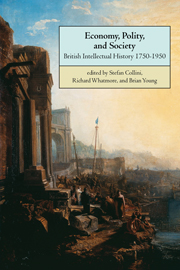Book contents
- Frontmatter
- Contents
- Preface
- General introduction
- Presentation of Economy, Polity, and Society
- Part I
- Part II
- Part III
- 9 Political and domestic economy in Victorian social thought: Ruskin and Xenophon
- 10 State and market in British university history
- 11 Mr Gradgrind and Jerusalem
- List of contributors
- Acknowledgements
- Index
11 - Mr Gradgrind and Jerusalem
Published online by Cambridge University Press: 18 December 2009
- Frontmatter
- Contents
- Preface
- General introduction
- Presentation of Economy, Polity, and Society
- Part I
- Part II
- Part III
- 9 Political and domestic economy in Victorian social thought: Ruskin and Xenophon
- 10 State and market in British university history
- 11 Mr Gradgrind and Jerusalem
- List of contributors
- Acknowledgements
- Index
Summary
No sympathetic reader of Dickens's Hard Times is likely to credit Mr Gradgrind with the ability to build Jerusalem among the dark satanic mills of Coke-town. Dickens did not, of course, share William Blake's visions: his own version of Jerusalem would probably have been a cheerier, less corrupt, and more efficient version of the society in which he lived and prospered. Nevertheless, he certainly hoped that the combination of utilitarianism and political economy embodied in the Gradgrind caricature would provide his readers with a thought-provoking statement of the problems of life in the Coke-towns of his day. Judging by the legacy of the image he created, Dickens succeeded beyond his own intentions and inclinations.
By inscribing Hard Times to Thomas Carlyle – the leading abominator of the worship of Mammon, the scourge of the ‘cash nexus’ and of the ‘dismal science’ that appeared to reflect or celebrate these features of modern life – Dickens was aligning himself with a powerful anti-utilitarian current in the debate on the ‘condition-of-England’ question, another of Carlyle's coinages. He did so effectively enough for John Ruskin, a fellow-admirer of Carlyle, to commend the novel to his own readers when he decided to unmask the fallacies of the soi-disant science of political economy in Unto This Last (1862). All three authors were still sufficiently in tune with one another to collaborate in opposing the campaign to prosecute Governor Eyre in 1865–6. The campaign was being mounted by John Stuart Mill and his ‘radical’ associates, and it provided Carlyle and Ruskin with an opportunity to repeat their criticisms of the canting qualities of the science with which Mill's name was then so firmly linked.
- Type
- Chapter
- Information
- Economy, Polity, and SocietyBritish Intellectual History 1750–1950, pp. 243 - 266Publisher: Cambridge University PressPrint publication year: 2000
- 7
- Cited by

